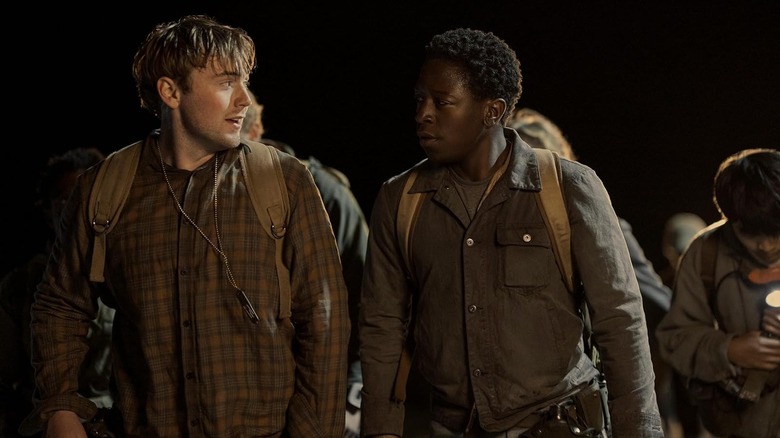The Shawshank Redemption Director's Canceled Stephen King Movie Sounds Amazing
Frank Darabont is responsible for directing three of the best Stephen King film adaptations ever released: 1994's "The Shawshank Redemption," 1999's "The Green Mile," and 2007's "The Mist." All three of these movies were so well-made (and so well-received) that you'd think he'd just keep making King films for the rest of his career. Tragically, that hasn't been the case, and ever since "The Mist," he's largely stayed out of the movie business altogether.
But while he's yet to return to the Stephen King universe following "The Mist," he did once have plans to make an adaptation of King's 1979 novel "The Long Walk," itself an arguably darker King story than any of the previous ones Darabont has adapted. As he explained to UGO in 2008:
"Somewhere down the line, I'll be [directing] 'The Long Walk,' which is another Stephen King piece [published under his pseudonym, Richard Bachman]. And when I make that, that'll be even lower budget than 'The Mist' was. It'll be weird, existential, and very contained, like the story. A bit more of an arthouse film than anything."
His plans to adapt "The Long Walk" never panned out, however, and the story is now being brought to the big screen by Francis Lawrence (of "The Hunger Games" fame) instead. We don't exactly know what went wrong with Darabont's plans, but we know it was hardly the only disappointment he's had to deal with. Not only did his departure as the creator and showrunner of "The Walking Dead" come about under pretty bleak circumstances, but his other big dream (to turn "Fahrenheit 451" into a movie) was apparently crushed by Hollywood too.
Why so many directors have wanted to adapt The Long Walk
People have been talking about a potential "The Long Walk" film since nearly the moment the book came out, which is weird because the book (on paper at least) isn't all that cinematic. The novel's about an annual contest in the future where 100 teenaged boys have to walk indefinitely; when one of them gets too exhausted to walk, they're shot dead. The contest continues until there's only one boy left walking, and every year the winning boy is far too exhausted and broken by the end to even celebrate his victory.
Not only is the premise bleak, but the idea of watching people walk for two hours doesn't seem exciting. We've seen plenty of movies and shows with the premise of a reality show game with life-and-death stakes, but those stories — "Squid Game," "The Hunger Games," and even "The Running Man" (another King title) — had far more variety ingrained into their premise. At least those poor "Squid Game" contestants got to jump rope for a bit.
But where the book truly shines is with how deeply it takes us inside the main character's head. Much like how anyone's mind will wander when they go for a long walk, the novel's narration jumps smoothly back and forth between the titular walk and all the little moments from the protagonist's life that led to him joining it. There are also a couple of hallucinatory sequences in the book, on account of the story's narrator starting to deteriorate mentally from sheer exhaustion.
The character's gradual loss of sanity is something that's best suited for the literary medium it was originally portrayed in, but it's possible that a talented director could do a great job with that material too. The jury's still out on how Lawrence will handle it in his "Long Walk" adaptation, but there's little doubt that Darabont could've knocked this one out of the park.

